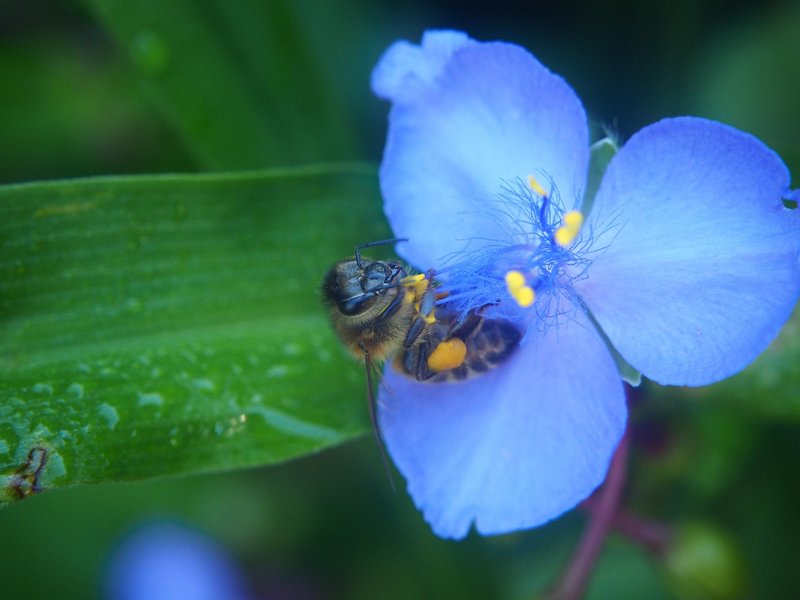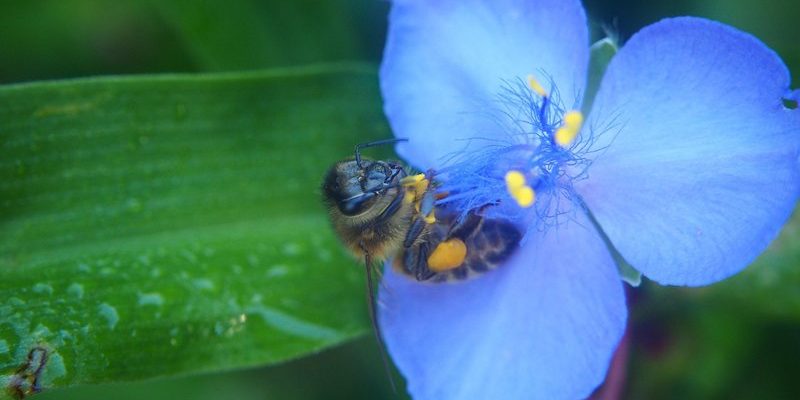
Pollination is more than just a buzzword in environmental science; it’s a vital process that supports ecosystems and human life alike. The blue banded bee, with its striking blue stripes and unique buzzing flight, is not only a beautiful sight to behold but also a powerhouse in the pollination department. Let’s explore how this small bee contributes to the ecosystem, why it’s essential to protect these critters, and what we can do to support their population.
Understanding the Blue Banded Bee
The blue banded bee belongs to the *Amegilla* genus and is commonly found in various regions, particularly in Australia and parts of Southeast Asia. These bees are easily recognizable thanks to their distinct blue stripes, but there’s much more to them than just good looks.
Unlike honeybees, blue banded bees are solitary creatures. They don’t live in hives; instead, they nest in the ground or in small crevices. This means that each bee operates independently, which can be quite fascinating! Their foraging habits are uniquely adapted to pollinate specific plants, particularly native Australian flora that other bees might overlook.
You might be wondering why it’s so important to have these blue-striped pollinators around. Well, their specialized method of pollination, called “buzz pollination,” allows them to release pollen from certain flowers effectively. Here’s the thing: many plants have evolved to depend on this unique interaction. Without bees like these, some plants may struggle to reproduce, which in turn affects the entire food chain.
The Importance of Pollination
Pollination is a natural process where pollen from the male part of a flower travels to the female part. This action enables plants to produce fruits and seeds. Without pollinators like blue banded bees, many of the fruits and vegetables we love would become scarce.
Here are some reasons why pollination matters:
- Food Production: About one-third of the food we eat relies on pollinators. This includes fruits, vegetables, nuts, and seeds.
- Plant Diversity: Pollination helps maintain biodiversity in ecosystems, allowing various species to thrive.
- Wildlife Habitats: Healthy plant life supports a wide range of wildlife, creating balanced ecosystems.
Without these busy bees and others like them, our diets would look quite different. Think about it: no apples or cherries? That’s a sad thought! The blue banded bee’s role in this process is vital to ensuring that the plants can flourish, offering us and other creatures the food we need to survive.
How Blue Banded Bees Pollinate
Pollination is not just about transferring pollen; it’s an art form, especially for blue banded bees. They perform something called “buzz pollination.” This unique technique involves vibrating their bodies at a specific frequency to shake loose pollen from the flower’s anthers.
You might wonder why this matters. Well, many plants have evolved to thrive with this special technique. Here’s how it works:
1. Finding Flowers: Blue banded bees scout for flowers that are ready for pollination.
2. Vibrating: Once they land on a flower, they shake their bodies to release the trapped pollen.
3. Collecting: The bees then collect this pollen on their furry bodies, which they later transfer to other flowers.
This whole process is incredibly efficient and helps boost the reproductive success of many plants. Not only does this support the plants, but it also provides food for the bees! It’s a win-win situation in nature, and it makes the blue banded bee an essential player in the ecosystem.
Challenges Faced by Blue Banded Bees
Despite their important role in nature, blue banded bees are facing some significant challenges. Habitat loss, climate change, and pesticide use are all threats that can impact their populations.
– Habitat Loss: Urbanization and agricultural expansion often lead to the destruction of native plant species. Without their food sources and nesting sites, bees struggle to survive.
– Climate Change: Changes in weather patterns can disrupt the natural cycles of plants and pollinators. If flowers bloom earlier or later than usual, it can lead to a mismatch in availability.
– Pesticides: The use of harmful chemicals in farming can have devastating effects on bee populations. These substances can weaken bees or even lead to death when they come into contact with treated plants.
It’s crucial to understand these challenges to help protect these little creatures. Without them, we could face a future with less food and diminished biodiversity.
How to Support Blue Banded Bees
So, what can we do to support blue banded bees and ensure they continue their important work? Here are some simple steps anyone can take:
1. Plant Native Flowers: Choose flowers that are native to your region. These plants are adapted to local conditions and provide the best food sources for blue banded bees.
2. Avoid Pesticides: When gardening, opt for natural pest control methods. This helps keep the environment safe for bees and other beneficial insects.
3. Create Bee Habitats: Leave some areas of your garden a bit wild. Bare soil can be a great nesting place for solitary bees.
4. Educate Others: Share your knowledge about blue banded bees and their importance. The more people understand, the better we can work together to protect them.
Supporting these bees doesn’t require a lot of effort, but it makes a significant impact. Your backyard can become a bustling hub of activity for these essential pollinators.
The Future of Blue Banded Bees
Looking ahead, the future of blue banded bees hangs in the balance. As awareness of their importance grows, so does the commitment to protection. Conservation efforts are ramping up, with researchers studying their habits and habitats to better understand how to support them.
Community initiatives are also emerging, aimed at creating bee-friendly environments in urban areas. Imagine turning an empty lot into a thriving garden filled with native plants that provide food and nesting sites for bees. It’s happening in many cities, and it’s a beautiful sight to see!
Every small action counts. By making informed choices, you can play a part in the broader effort to protect these fascinating creatures and the ecosystems they support.
In conclusion, the blue banded bee is more than just a colorful insect; it’s a key player in our ecosystem. The next time you see one buzzing around, take a moment to appreciate the vital role it plays in keeping our world blooming and beautiful. By understanding their significance and actively supporting their populations, we can ensure a healthier planet for generations to come.

